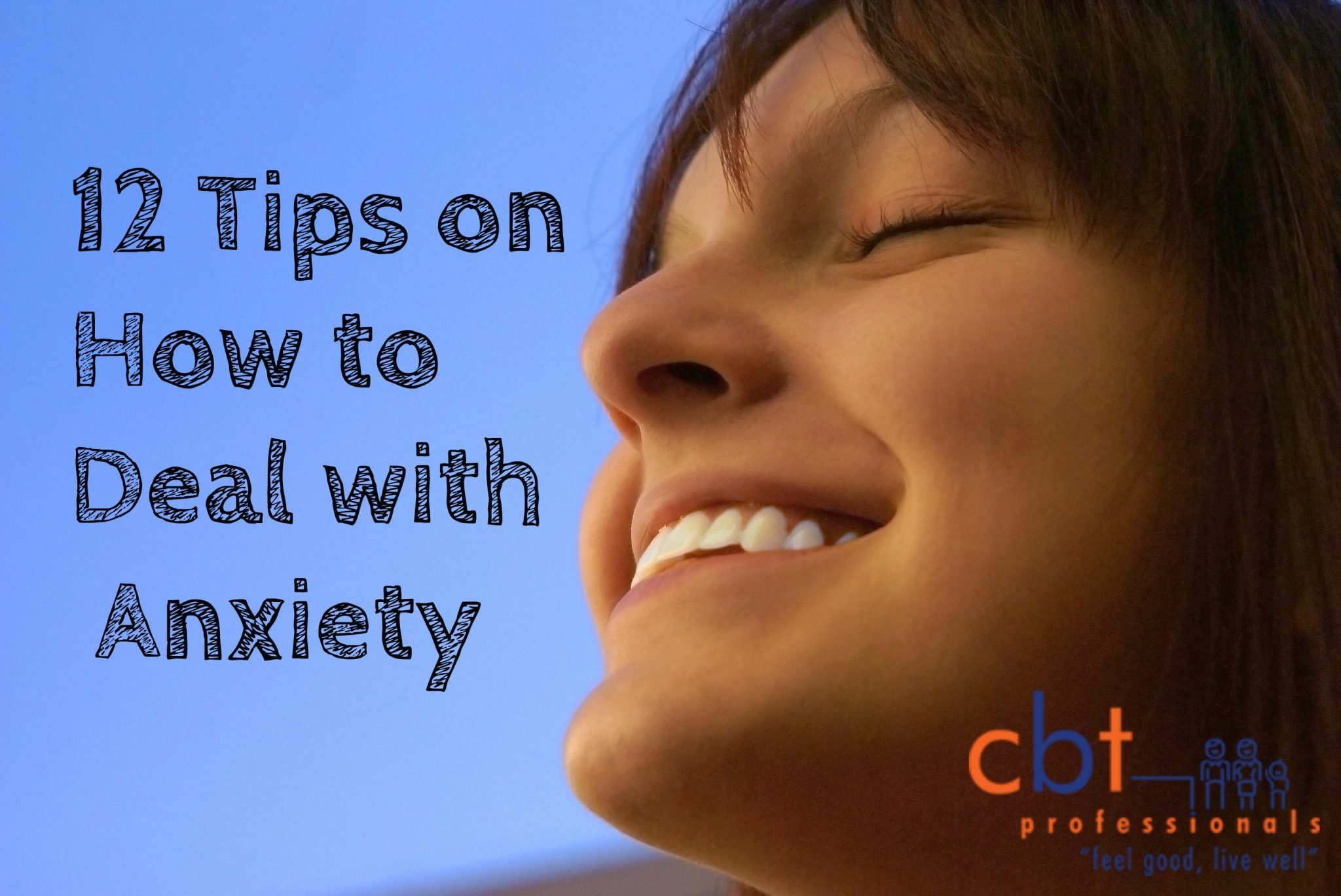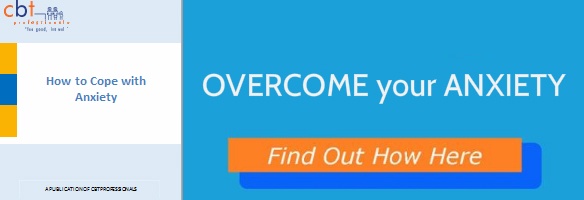- Gold Coast Psychologists & Online Psychologists
- Coomera (07) 5551 0251
- Nerang (07) 5668 3490
- admin@cbtprofessionals.com.au
12 Tips on How to Deal with Anxiety

Are you suffering with anxiety? You can learn how to deal with anxiety so that it does not control your life! One of the most important things is to understand anxiety. Many people struggling with anxiety report fears that they are going crazy or that there is something wrong with them which only makes anxiety worse.
What is anxiety?
Many clients initially express wanting therapy to get rid of anxiety. However, it is important to realise that anxiety is a normal human experience. It is normal to experience anxiety in response to negative and stressful life events. Also, anxiety has an important function.
Anxiety helps to protect us and prepare us for real physical danger. This is your fight or flight response. It is your life saving alarm and is essential for keeping you safe. The fight or flight response gets your body ready to protect itself such as tense muscles so that you can respond quickly and giving you the energy to run away from or fight off danger. The tricky part is, sometimes our body can get ready to protect when there is no real physical danger to us. This is a false alarm when your fight or flight response is too sensitive and being triggered at the wrong time.
Anxiety can be a problem in our lives when our brain and body tells us there is danger when there is no real threat. We can come to experience intense and
frequent anxiety, feel exhausted, fear
anxiety symptoms and many situations and avoid doing important daily life activities.
Anxiety Symptoms
Body Symptoms:
When you are anxious and your life saving alarm is activated symptoms in your body can include:
- Pounding, fast heart rate
- Sweating
- Shaking
- Feeling short of breath
- Feeling like you are choking
- Chest pain
- Nausea
- Feeling dizzy, light-headed, or faint
- You may feel sensations of heat or chills
- Numbness or tingling sensations
- Feelings of unreality or detached from oneself
Anxiety symptoms are not dangerous, they are there to protect you from danger, but they can feel very scary.
Anxious thoughts:
How you interpret a situation, experience or sensation in your body can influence how anxious you feel and what you choose to do. You may have worries predicting worst case scenarios, fear of failure, worry about finances; work; health, fear of specific objects, animals or situations such as specific phobia of flying; spiders; injections and fear of being criticised or negatively evaluated by others.
Anxious behaviours:
You may have noticed you are avoiding places, people and things in your life that you are anxious about. This is when anxiety is pushing you around, you can believe you are in real danger even when there is no real threat and miss out on work opportunities, social occasions, relationships and fun/leisure activities.
What is your personal experience of anxiety?
It is helpful to identify what you are anxious about. What are the situations that trigger your anxiety? What changes do you notice in your body? (e.g. fast breathing, sweating, muscle tension). What anxious thoughts are you having? (e.g. they think I am stupid, I will fail, I can’t do this, I can’t cope, I’m having a heart attack). What behaviours have you been engaging in such as avoidance (e.g. avoiding social situations, making excuses to not do something at work).
12 Tips on How to Deal with Anxiety
1. Do not let your anxiety control you and affect your choices.
2. If you are experiencing intense physical anxiety symptoms stay where you are, don’t escape/run away from the situation. In confronting your fear you give yourself a chance to learn that there is no danger to you.
3. If you are breathing too quickly this can make your symptoms worse. Try a slow-breathing exercise as soon as you can (see explanation below).
4. Remind yourself what is happening – ‘this is anxiety’.
5. Remind yourself about the facts ‘anxiety attacks are not harmful’, ‘this is a false alarm’.
6. Ride out your anxiety.
7. Try opening up to your feelings allowing them to be.
8. Ground yourself in the moment. Notice what you can see and hear in the environment around you. Notice you can move your body at the same time that you have this anxiety.
9. As soon as you can, get back to what you were doing and continue with your plan. It can be helpful to remind yourself what this activity contributes to your life or why it is important to help motivate you to keep going. Remind yourself of helpful and encouraging self-talk.
10. Do breathing exercises – Anxiety sufferer’s often over-breath which actually causes symptoms of anxiety such as feeling dizzy, light-headed, nauseous, make your chest feel tight, sensations of pins and needles, or you may feel like you can’t breathe. For a free breathing exercise download our eBook here.
11. Make relaxation a part of your daily life with strategies such as: progressive muscle relaxation techniques, yoga, doing the things you enjoy, having a warm bath, listening to music, etc. Create your own menu of relaxation strategies. We have included a progressive muscle relaxation script free for you in our eBook.
12. Have healthy lifestyle habits
• regular exercise such as a brisk walk can help release tension
• nurture your body with regular healthy meals
• reduce/avoid alcohol, caffeine, smoking
• get enough sleep.
Do I have a psychological disorder?
This blog offers some tips about how to deal with anxiety. If you are struggling with anxiety this does not mean that you have a psychological disorder. These tips may be enough for you to begin dealing better with your anxiety. However, for some people anxiety can become severe, frequent and pervasive interfering with daily life functioning. This may negatively impact on relationships, home life and effectiveness at work.
If anxiety is affecting your daily life it can be helpful to discuss your anxiety with your General Practitioner who can complete relevant medical and psychological assessments and refer you for psychological therapy. A psychologist can complete an assessment identifying the possible factors contributing to your anxiety and design an individually tailored treatment plan to help you learn how to deal with your anxiety.
If you would like to learn more about the psychological treatments for anxiety, then download our eBook here. It describes in detail the two main evidence based therapies for anxiety, which will help you understand the psychological principles and skills a psychologist will talk you through.


